2025 Reading Challenge discussion
ARCHIVE 2020
>
Raimondo's 37 Books in 2020
date newest »
newest »
 newest »
newest »
message 1:
by
Raimondo
(last edited May 31, 2020 11:16AM)
(new)
May 06, 2020 08:50AM
 I'm going to read at least 37 books and 10,000 pages this year.
I'm going to read at least 37 books and 10,000 pages this year.
reply
|
flag
 BOOK 1 of 37
BOOK 1 of 37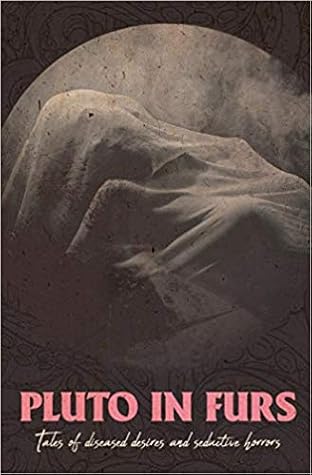
Pluto In Furs: Tales Of Diseased Desires And Seductive Horrors by Scott Dwyer
Date Completed: May 8th 2020
Pages: 308
My Rating: ★★★
The title is an allusion to Sacher-Masoch's seminal S&M classic Venus in Furs. This book though focuses on the Thanatic impulse as it usurps the purview of the erotic, shrouding the fires of passion with the funereal gloom of savage fetishism, unholy obsessions, and fatal lust. The stories are of a literary bent although I fear that in this case, the cool malignance and visceral primality that I've always adored in horror may have been sacrificed on the altar of majestic wordsmithery.
Among the tales offered here, I found the following particularly enticing:
The Tangible Universe - a debauchee hitches his wagon to the constellation of his desire
Dermatogy, Eschatology - a hypochondriac is enmeshed in the profound (but fatal, alas) communion that he has always longed for
The Gutter at the Bottom of the World - where the lost, used, and forgotten end up
The Silvering - a hovel drowns in unholy argent ecstasy
7/10; 3 stars.
Total Books: 1 of 37 (2.70%)
Total Pages: 308 of 10,000 (3.08%)
 BOOK 2 of 37
BOOK 2 of 37
Barbara Walker Tarot by Barbara Walker
Date Completed: May 10th 2020
Pages: 78
My Rating: ★★★★★
Intense, impassioned, potent, and accurate. Its minors and courts portray lush scenes and personages from diverse mythologies and legends. An air of cool menace pervades the entire thing, suggesting a ruthless, calculating philosophy that thoroughly enchanted me. It has some of the most evocative images I've ever encountered in a deck, with tableaus that depict moments of great triumph and tribulation, unfettered opulence and deep vicissitude, puissance and frailty, grandeur, bliss, serenity, desire, disillusionment, sorrow, despair, etc. It's perfect for political, business, career, and yes, even personal readings.
The little white book is informative enough, but if you want to delve deeper you may want to check out The Secrets of the Tarot: Origins, History, and Symbolism. It's an enticing companion tome with a profoundly erudite if somewhat sketchy scholarship. Still very much worth the read though.
9/10; 5 stars.
Total Books: 2 of 37 (5.41%)
Total Pages: 386 of 10,000 (3.86%)
 BOOK 3 of 37
BOOK 3 of 37
Tender Is the Flesh by Agustina Bazterrica
Date Completed: May 15th 2020
Pages: 224
My Rating: ★★★★
I marvel at the creativity with which the author rendered the human body as nothing but a gustatory staple, as mere material. Brochettes made of ears and fingers, human leather meticulously flayed from screaming "products", game reserves where hunters target debt-addled celebrities, atrocious laboratory experiments where vivisection is but all too common - the mind boggles at all this delicious (hah!) depravity. But no, in this world using this merchandise for labor carries the ultimate penalty because "slavery is barbaric". Oh, the exquisite irony.
In a world where men are reduced to their basest level and treated as just another commodity, it's no surprise that even those who maintained their status as human, as the ultimate consumer, would in time question if they have not sacrificed the moral part of themselves that has always set them above beasts and cattle. Or perhaps it's just a matter of conditioning? Maybe future generations inured to this arrangement would eventually deem it as the natural order of things.
Amidst shocking scenes of methodical butchery, there flicker a few somber moments of tenderness and genuine regard. It's terribly unfair: just as our lead is slowly, wearily beginning to reclaim his humanity, he takes one step closer to ending up losing it in the eyes of society and the world.
8/10; 4 stars.
Total Books: 3 of 37 (8.11%)
Total Pages: 610 of 10,000 (6.10%)
 BOOK 4 of 37
BOOK 4 of 37
Gratitude by Oliver Sacks
Date Completed: May 18th 2020
Pages: 64
My Rating: ★★★★
This is a quartet of poignant essays that touches on what it means to celebrate, to meditate upon, and - most importantly - to bid adieu to a life well-lived. Gratitude serves as the prime thread that binds these pieces. This is really no surprise given the lifetime of love and acclaim that came the author's way. It's an inspiring testament of how there still remains some wisdom to be gained amidst the deep winter of our mortal coil. Nunc dimittis indeed.
I especially like the author's clear, unembellished style. It's unsentimental without being frigid, and sanguine despite its simplicity. It projects sincerity, the pursuit of precision unmarred by gauche strain. His scientific training is quite manifest here.
I did note some striking synchronicities of a rather metaphysical bent regarding a few ideas he raised in the book. In Mercury, he professed how he relates his age to its corresponding element in the Periodic Table. He lived up to 82, which is the atomic number of Lead. This is one of the seven metals of alchemy, which in classical astrology is associated with the planet Saturn. Saturn of course rules Saturday, which in Orthodox denominations is celebrated as the Sabbath. The latter in turn serves as the very subject of Sacks's swan song, published as the concluding essay here. Saturn also represents old age, restriction, and mortality, possessing an intimate knowledge of the limits of time and matter. Amazingly, these just about sum up the central themes of this book.
Wonders never cease.
8/10; 4 stars.
Total Books: 4 of 37 (10.81%)
Total Pages: 674 of 10,000 (6.74%)
 BOOK 5 of 37
BOOK 5 of 37
Quicksand by Jun'ichirō Tanizaki
Date Completed: May 23rd 2020
Pages: 224
My Rating: ★★★★★
When it comes to sordid tales of amorous brinkmanship, of seamy, unbridled sexual politics fueled by obsessions that border on the erotomanic - Tanizaki is in a league of his own. Nowhere is it more evident than in this book, dissecting as it does the noxious, hothouse atmosphere of a fatal ménage à quatre stifling under all of its baneful permutations. And laboring under such an impossible, claustrophobic backdrop, is it any surprise that our fated pair were only able to purchase a measure of peace at such a heavy price? For it is only near the end that we are able to perceive what is truly, fully at stake here, and that all of this is anything but a game.
Mesmerizing, poisonous, and revolting, it is as if an asp somehow metamorphosed into a book, its fangs transfiguring into hypnotic prose that will in the end catch you unawares when it delivers its treacherous bite. There are few hells as beguilingly torturous as the web that our femme fatale spun around our leads. Indeed, this is one of the most resonant books I've read in years, and my only gripe is that the end came all too quickly. With a cool, distinct style that flows like envenomed honey, lovers of amatory literature will find plenty to savor here.
9.5/10; 5 stars.
Total Books: 5 of 37 (13.51%)
Total Pages: 898 of 10,000 (8.98%)
 BOOK 6 of 37
BOOK 6 of 37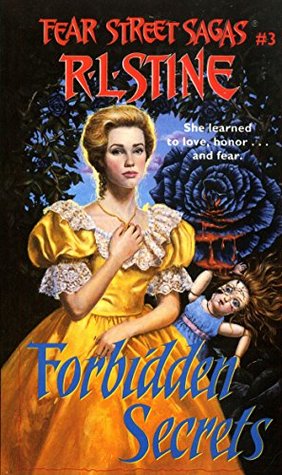
Forbidden Secrets by R.L. Stine
Date Completed: May 26th 2020
Pages: 176
My Rating: ★★★
This is one of the more memorable entries in Stine's vast retro YA oeuvre. It is lush Gothic horror with glimmers of a Southern sensibility - a far cry from the jejune, uninspired pieces in the Fear Street series. Macabre black roses, dolls dressed in mourning black, funereal weddings in empty stone churches, and all manner of baleful sorcery create an intriguing atmosphere that makes this such a piquant morsel. Add to these all those grotesque deaths and it's no wonder this is such a breeze to read.
Perusing the copyright page, it says that this was written by a certain Brandon Alexander. I wonder how much creative license he was allowed. This tosh is far from literary, but it does stand head and shoulders above books of the same ilk.
7/10; 3 stars.
Total Books: 6 of 37 (16.22%)
Total Pages: 1,074 of 10,000 (10.74%)
 BOOK 7 of 37
BOOK 7 of 37
Very Good, Jeeves! by P.G. Wodehouse
Date Completed: May 31st 2020
Pages: 272
My Rating: ★★★★
I'm not much of a fan of comedic literature but dash it, the British humour here is so spot on. All the pluck and iron of the Woosters are not quite enough to save our sweetly ineffectual Bertie (along with a few of his addled pals) from battleaxe aunts, flighty redheads, rampaging swans, and distasteful objets d'art, among other vexations. It's a good thing he has a redoubtable valet to bail him out of sundry predicaments.
With Jeeves's formidable intellect, one wonders why he doesn't stand for parliament. Is it ye olde "feudal spirit"? Or maybe it's just the perspicacity to steer clear of vipers. In any case, the tactical brilliance he employs to save his master's hide despite the latter's strenuous efforts to the contrary is nothing short of breathtaking.
7.5/10; 4 stars.
Total Books: 7 of 37 (18.92%)
Total Pages: 1,346 of 10,000 (13.46%)
 BOOK 8 of 37
BOOK 8 of 37
Joy in the Morning by P.G. Wodehouse
Date Completed: June 30th 2020
Pages: 272
My Rating: ★★★
Our winsome airhead Bertie finds himself trapped in that horrid English country malebolge, Steeple Bumpleigh, through the not-so-tender ministrations of capricious Fate. Or maybe it was just his valet. Regardless, what with scheming star-crossed lovers, ornery step-uncles, pestiferous boy scouts, hulking green-eyed fiancés, and a frightful former flame that threatens to go full Vesuvius once more, it will take all of Jeeves's spacious bean and maybe a miracle of Abrahamic proportions to extricate him from the place with his person intact.
It seems like it's best to take Wodehouse like those sinful sprouted scones - i.e. in small, measured doses - lest they cause trouble in the breadbasket. I thoroughly enjoyed the Wooster anthologies, but this one felt like a jest that stretched itself too thin. The wit didn't sparkle; the mots weren't very bons.
I also frown (and forcefully, at that) when I reckon how Jeeves dragged Bertie through this heap even when his master's distaste for the place was made sternly manifest. All of this sturm und drang - and for what? A spot of pleasurable fishing? In this, he definitely overstepped his bounds. I can just imagine the denizens of the Junior Ganymede Club collectively blanching when they get wind of this, with maybe a nostril or two quivering in disapproval.
5/10; 3 stars.
Total Books: 8 of 37 (21.62%)
Total Pages: 1,618 of 10,000 (16.18%)
 BOOK 9 of 37
BOOK 9 of 37
Man Alone with Himself by Friedrich Nietzsche
Date Completed: July 4th 2020
Pages: 82
My Rating: ★★★★
I dove into this book knowing next to nil about Nietzsche and hauled myself off its seductive waters pretty much impressed.
Regarding the title: he has some fairly controversial ideas on solitude. While it is the instinctive aspiration of superior people, inasmuch as they'd oft be apprehensive of/distressed upon dealing with the inanities the mediocre imposes upon them, as a man predestined for wisdom he would still deign to traffick with them, not least because he finds their antics interesting. After all, keeping bad (i.e. inferior) company is necessary for every philosopher or he risks limiting his knowledge. Some cynics can't help but cut short any such intercourse though.
All of that does sound rather elitist, but therein lies one's fascination with his genius. At times he displays a subtle, mordant wit; but when he's in fine form he can bludgeon you with the most unsavory apothegms.
He also opines how being implacable when it comes to one's convictions is the mark of a regressive mind. As one grows in knowledge, one is wont to take a critical look at one's beliefs. If he finds them untenable he must not hesitate to discard them. Especially when his confidence in his philosophies remains strong, he must not be afraid to challenge them. And if they still hold firm he must not be dismissive of other schools of thought, for the absolute truth does not exist. One must always cultivate one's thinking and be careful lest it calcify, become inflexible, and pervert its autonomy by surrendering to the false comforts provided by dogma.
You won't always agree with him, but at the very least he'd give you some stimulating food for thought. And in rationalizing your position, while he may not always succeed in making you reconsider, indirectly he did induce you to refine it, a process which in itself I found quite rewarding. Indeed, right near the beginning of this text, one is enjoined to keep an open, critical mind:
We criticize a thinker more sharply when he proposes a tenet that is disagreeable to us; and yet it would be more reasonable to do this when we find his tenet agreeable.
In a sense, the author proffers you his ideas as if they were mirrors, directing back to your gaze your own convictions and biases, your virtues and your hypocrisies. He keeps you on your toes: sometimes an aphorism has a parallel waiting in the wings. For example, towards the middle of the first part, he warns against a shallow grasp of one's persuasions, since
We often make the mistake of actively opposing a direction, or party, or epoch, because we coincidentally get to see only its superficial side, its stunted aspect, or the inescapable ‘faults of its virtues,’ – perhaps because we ourselves have participated to a large degree in them. Then we turn our back on them and seek an opposite direction; but it would be better to look for the strong, good sides, or to develop them in ourselves. To be sure, it takes a stronger gaze and a better will to further that which is evolving and imperfect, rather than to penetrate its imperfection and reject it.
But then, elsewhere, he ruminates on the irony of diving in too deep, because
People who comprehend a matter in all its depth seldom remain true to it forever. For they have brought its depths to the light; and then there is always much to see about it that is bad.
One does not invalidate the other; indeed, taken together, they provide a fuller view of the truths he wishes to communicate. Still: landing back at square one must surely rankle, no?
Some of the choicest maxims here are:
Life consists of rare, isolated moments of the greatest significance, and of innumerably many intervals, during which at best the silhouettes of those moments hover about us. Love, springtime, every beautiful melody, mountains, the moon, the sea – all these speak completely to the heart but once, if in fact they ever do get a chance to speak completely. For many men do not have those moments at all, and are themselves intervals and intermissions in the symphony of real life.
There are great advantages in for once removing ourselves distinctly from our time and letting ourselves be driven from its shore back into the ocean of former world views. Looking at the coast from that perspective, we survey for the first time its entire shape, and when we near it again, we have the advantage of understanding it better on the whole than do those who have never left it.
. . . Not to cleave to one’s own detachment, to that voluptuous remoteness and strangeness of the bird which flies higher and higher so as to see more and more beneath it – the danger which threatens the flier. Not to cleave to our own virtues and become as a whole the victim of some part of us, of our ‘hospitality’ for example, which is the danger of dangers for rich and noble souls who expend themselves prodigally, almost indifferently, and take the virtue of liberality to the point where it becomes a vice. One must know how to conserve oneself: the sternest test of independence.
. . . It must offend their pride, and also their taste, if their truth is supposed to be a truth for everyman, which has hitherto been the secret desire and hidden sense of all dogmatic endeavours. ‘My judgement is my judgement: another cannot easily acquire a right to it’ – such a philosopher of the future may perhaps say. One has to get rid of the bad taste of wanting to be in agreement with many . . . In the end it must be as it is and has always been: great things are for the great, abysses for the profound, shudders and delicacies for the refined, and, in sum, all rare things for the rare.
8/10; 4 stars.
Total Books: 9 of 37 (24.32%)
Total Pages: 1,700 of 10,000 (17.00%)
 BOOK 10 of 37
BOOK 10 of 37
A Cup of Sake Beneath the Cherry Trees by Yoshida Kenkō
Date Completed: July 6th 2020
Pages: 51
My Rating: ★★★★
On a moonlit night, a snowy morning, or beneath the flowering cherry trees, it increases all the pleasures of the moment to bring out the sake cups and settle down to talk serenely together over a drink.
With a warm, accessible style that makes this book such a pleasure to read, I went through this like the proverbial hot knife through butter.
Some of the passages can be quite dazzling. Lyrical and profound, unforgettable in its clarity and in the serenity it inspires, it has some of the most moving evocations of nature I've ever encountered. His ode to the seasons is particularly striking:
. . . Everyone seems to feel that ‘it is above all autumn that moves the heart to tears’, and there is some truth in this, yet surely it is spring that stirs the heart more profoundly. Then, birdsong is full of the feel of spring, the plants beneath the hedges bud into leaf in the warm sunlight, the slowly deepening season brings soft mists, while the blossoms at last begin to open, only to meet with ceaseless winds and rain that send them flurrying restlessly to earth. Until the leaves appear on the boughs, the heart is endlessly perturbed. . .
Behold, too, his raptures over the setting moon:
Rather than gazing on a clear full moon that shines over a thousand leagues, it is infinitely more moving to see the moon near dawn and after long anticipation, tinged with most beautiful palest blue, a moon glimpsed among cedar branches deep in the mountains, its light now hidden again by the gathering clouds of an autumn shower. The moist glint of moonlight on the glossy leaves of the forest shii oak or the white oak pierces the heart, and makes you yearn for the distant capital and a friend of true sensibility to share the moment with you.
It all hearkens to our shared natural past, to the pastoral and the rustic, evincing as it does the beating, vibrant pulse of the written word.
On the other hand, this monk doesn't shy from the ribald at all. A wizard neutralized by the sight of a woman's legs, young acolytes going hither and thither on intimate assignations - these all add a piquant flavor to the entire thing. Let it not be said that Kenko has a limited range.
Some gems that struck a deep chord in me are:
It is most important to present well, in both appearance and bearing. One never tires of spending time with someone whose speech is attractive and pleasing to the ear, and who does not talk overmuch. There is nothing worse than when someone you thought impressive reveals himself as lacking in sensibility. Status and personal appearance are things one is born with, after all, but surely the inner man can always be improved with effort. It is a great shame to see a fine upstanding fellow fall in with low and ugly types who easily run rings round him, and all for want of cultivation and learning.
Those who feel the impulse to pursue the path of enlightenment should immediately take the step, and not defer it while they attend to all the other things on their mind. If you say to yourself, ‘Let’s just wait until after this is over,’ or ‘While I’m at it I’ll just see to that,’ or ‘People will criticize me about such-and-such so I should make sure it’s all dealt with and causes no problem later,’ or ‘There’s been time enough so far, after all, and it won’t take long just to a wait a little longer while I do this. Let’s not rush into things,’ one imperative thing after another will occur to detain you. There will be no end to it all, and the day of decision will never come.
A man who was studying archery took two arrows in his hand and stood before the target. ‘A beginner should not hold two arrows,’ his teacher told him. ‘You will be careless with the first, knowing you have a second. You must always be determined to hit the target with the single arrow you shoot, and have no thought beyond this.’
Nothing in this world can be trusted. Fools put all their faith in things, and so become angry and bitter . . . If you rely neither on yourself nor on others, you will rejoice when things go well, and not be aggrieved when they don’t. Maintain a clear space on either side, and nothing will obstruct you; keep open before and behind you, and you will be unimpeded. If you let yourself be hemmed in, you can be squeezed to breaking point. Without care and flexibility in your dealings with the world, you will find yourself in conflict and be damaged, while if you live calmly and serenely, not a hair on your head will come to harm.
However, even taking into account the context of its era and culture, there are nevertheless some ideas here which I can't help but object to. Consider this one:
Why cling to a life which cannot last for ever, only to arrive at ugly old age? The longer you live, the greater your share of shame. It is most seemly to die before forty at the latest. Once past this age, people develop an urge to mix with others without the least shame at their own unsightliness; they spend their dwindling years fussing adoringly over their children and grandchildren, hoping to live long enough to see them make good in the world. Their greed for the things of this world grows ever deeper, till they lose all ability to be moved by life’s pathos, and become really quite disgraceful.
Really, 40? Kenko was in his mid-40's when he wrote this book, so that's rich coming from him. I also don't think that getting on in years would inevitably make the average person insufferable and/or grotesque.
It's not all negative though, as elsewhere he conceded that:
. . . In age, on the other hand, the spirit weakens, we become indifferent and apathetic, and nothing rouses us. The heart grows naturally calm, so that we no longer act in futile ways but instead tend to our bodies, live free of discontent and try to avoid troubling others. Age has more wisdom than youth, just as youth has more beauty than does age.
His ideas on the kinds of people to befriend or avoid are quite curious:
There are seven types of people one should not have as a friend. The first is an exalted and high-ranking person. The second, somebody young. The third, anyone strong and in perfect health. The fourth, a man who loves drink. The fifth, a brave and daring warrior. The sixth, a liar. The seventh, an avaricious man.
Hold on. The last two I perfectly understand, but what's wrong with having a robust pal? Ought I be shunned for being in fine fettle? Anyway, to continue:
The three to choose as friends are – one who gives gifts, a doctor and a wise man.
Well, cheers to that!
7.5/10; 4 stars.
Total Books: 10 of 37 (27.03%)
Total Pages: 1,751 of 10,000 (17.51%)
 BOOK 11 of 37
BOOK 11 of 37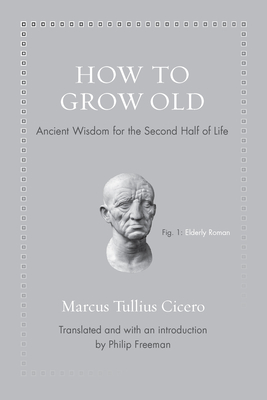
How to Grow Old: Ancient Wisdom for the Second Half of Life by Marcus Tullius Cicero
Date Completed: July 9th 2020
Pages: 208
My Rating: ★★★★
This is an admirable treatise on the art of aging well. You don't have to be getting on in years to glean some wisdom from this. After all, we should start preparing for the winter of our lives while we are still young, developing the internal qualities (like moderation, discretion, fortitude, etc.) and learning from the experiences that will later serve us in good stead. As Cicero wrote:
Wrinkles and gray hair cannot suddenly demand respect. Only when the earlier years of life have been well spent does old age at last gather the fruits of admiration.
The book teaches us that old age is not synonymous to weakness or passivity. In the same way that judicious exercise and diet arrest the body's slide into decrepitude, so shall constant mental stimulation preserve our cerebral faculties.
It's also the best time to attend to our deepest passions. When lived correctly, one's golden years can be wonderfully productive (or sweetly serene - nothing wrong with that). I honestly don't have the maturity yet to look forward to it, but at least this book banished the vague horrors one usually associates with it.
I appreciate the generous notes. I didn't know that the term Senate or Senatus meant an assembly of leading senes or elders in Latin. The editor also doesn't shy from pointing out factual mistakes or inaccuracies on Cicero's part.
The only criticism I have here is that it only skims the surface of the very real negative concerns that beset old age since it focuses overwhelmingly on the advantages. Do you have a late-onset disease that so ravaged your body/intellect that you can't even perform at par with your peers? Just gotta tough it out, bud. That's stoicism for you.
In any case, it's the first book from antiquity that I read from start to finish. Admittedly, this is partially due to its brevity but really, if it's something this good and useful even if it's ten times as long I still would have devoured it. If this is any indication of how ancient classics are like, I'd definitely be stocking up on more. And yes this is literally a classic - written millenia ago and yet still very much relevant.
To sum it up: misery, existential or otherwise, is not a function of age but of character. As the author wrote:
Those who lack within themselves the means for living a blessed and happy life will find any age painful. But for those who seek good things within themselves, nothing imposed on them by nature will seem troublesome.
8.5/10; 4 stars.
Total Books: 11 of 37 (29.73%)
Total Pages: 1,959 of 10,000 (19.59%)
 BOOK 12 of 37
BOOK 12 of 37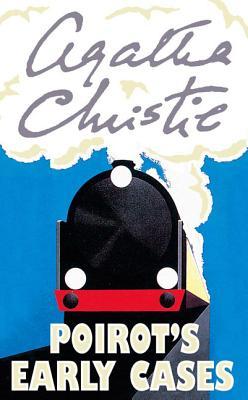
Poirot's Early Cases by Agatha Christie
Date Completed: July 13th 2020
Pages: 412
My Rating: ★★★
With a whopping eighteen stories, this is the quintessential Poirot anthology, and the one I'd recommend Christie tyros to get. Utterly addictive, I finished the entire thing in just a couple of days. And really, at its current price this gem is such a steal (hah!).
It contains my favorite Poirot petit cases, to whit:
Double Clue - where the redoubtable vixen Countess Vera Rossakoff makes her entrance.
The King of Clubs - when push comes to shove, it's always to one's family that one turns to.
The Chocolate Box - featuring that extreme rarity: a case that Poirot failed to solve even while in full possession of his faculties. And oh what a beaut it is.
Wasps' Nest - it's not very often that one comes across a Christie tale that tugs at one's heartstrings. Short and bittersweet.
7/10; 3 stars.
Total Books: 12 of 37 (32.43%)
Total Pages: 2,371 of 10,000 (23.71%)
 BOOK 13 of 37
BOOK 13 of 37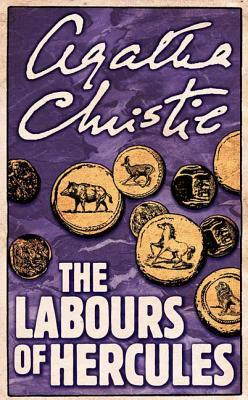
The Labours Of Hercules by Agatha Christie
Date Completed: July 15th 2020
Pages: 412
My Rating: ★★★★
Among the Poirot anthologies, I like this one the best. The Hercules motif was cleverly and rather creatively executed, and wasn't at all belabored (hah!) to the point of exhaustion. The immortal Hydra of small-town gossip, the Aegean Stables of high-level politics - these modern concepts dovetail neatly with their mythological affinities.
There is a certain unity of vision in these stories which, ironically enough, is made manifest in the very diversity of the dramatis personae and the crimes that attend them. From the affluent to the deprived, the high-born and the powerless, the young and the hoary, the beautiful and the ill-favored, and all manner of charlatans, felons, and murderers who ply their trade in between - they all romp through these pages, providing a rich panoply of cases from which our peerless Hercule forged his "final" labors.
Among the pieces here, my favorites are mostly the latter ones, featuring the cunning (if rather tortuous) smuggling of a recently unearthed Rubens in The Girdle of Hyppolita and the high-powered contest for the blood-soaked Borgia Cup in The Apples of the Hesperides.
8/10; 4 stars.
Total Books: 13 of 37 (35.14%)
Total Pages: 2,783 of 10,000 (27.83%)
 BOOK 14 of 37
BOOK 14 of 37
Endless Night by Agatha Christie
Date Completed: July 19th 2020
Pages: 303
My Rating: ★★★★★
This is by far my favorite Christie novel, and I've gone through troves of them. It presents a singular departure from her usual style, delivering an intimate, mesmerizing tale that's unlike anything she's ever created. Here (at last!) she gives us characters who live and breathe, who we can actually feel for and root for, who are not mere fodder for a murder du jour. Reading it, I felt like I was falling into a fever dream, into a blissful reverie that slowly, inexorably turns into a nightmare.
Even amidst paradise there were unsettling intimations of the tragedy to come. There were odd remarks, curious inconsistencies, an inkling that things don't quite add up. Still, the scythe when it fell came with a jolt, and from then on it was one bewildering, breathless ride into the horrifying climax. I can't remember ever being so swept away by a mystery novel.
It has shades of James's The Wings of the Dove, though for our anti-hero there will be no redemption. (view spoiler).
9.5/10; 5 stars.
Total Books: 14 of 37 (37.84%)
Total Pages: 3,086 of 10,000 (30.86%)
 BOOK 15 of 37
BOOK 15 of 37
Poirot Investigates by Agatha Christie
Date Completed: July 21st 2020
Pages: 265
My Rating: ★★★
These stories are so riveting that I finished the entire thing in a single day. Granted that I only read eleven of the pieces here since the last three were available in Poirot's Early Cases, which I just gobbled up last week. I simply can't express how eminently readable the author's prose is although really, the best part here is the exceptional plotting. I've been on a bit of a Christie binge lately, but far from feeling any fatigue I'm still raring for more.
I find the following cases especially engrossing:
The Adventure of the Western Star - the theft of a peerless diamond is announced in advance.
The Million Dollar Bond Robbery - our indefatigable Belgian is just as effective in cracking white collar crimes.
The Adventure of the Egyptian Tomb - the excavation of a pharaonic tomb ushers a death curse that strikes the primary members of an ill-fated expedition.
The Kidnapped Prime Minister - Poirot must locate a missing PM in time for a conference of international import.
7/10; 3 stars.
Total Books: 15 of 37 (40.54%)
Total Pages: 3,351 of 10,000 (33.51%)
 BOOK 16 of 37
BOOK 16 of 37
The Adventure of the Christmas Pudding by Agatha Christie
Date Completed: July 25th 2020
Pages: 363
My Rating: ★★★
This consists of three Poirot novellas and two shorts, with a dash of Marple to wrap things up. As a royal stone caper set in a deliciously old-fashioned English yuletide countryside, the eponymous opener is my firm favorite.
The Mystery of the Spanish Chest is an expansion of the 1932 original featuring a Baghdad box. It basically has the same culprit who is, strangely enough, the only renamed character here. The Underdog is an intriguing mystery, though the title rather gives the culprit away. Among the briefer pieces, only the perplexing Dream is noteworthy.
Overall this is an enjoyable anthology, though it doesn't really stand out when compared to Christie's other efforts.
6.5/10; 3 stars.
Total Books: 16 of 37 (43.24%)
Total Pages: 3,714 of 10,000 (37.14%)
 BOOK 17 of 37
BOOK 17 of 37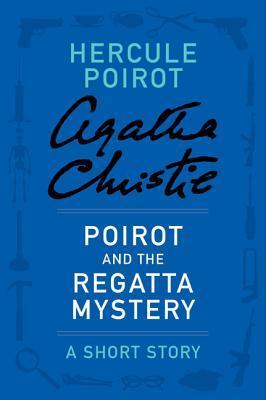
Poirot and the Regatta Mystery by Agatha Christie
Date Completed: July 27th 2020
Pages: 40
My Rating: ★★★
Aside from this e-book, this case is only available in the later editions of Hercule Poirot: The Complete Short Stories. The Regatta version available in most anthologies is a reworking of this original, starring Parker Pyne as the investigator instead.
On its own it's a good enough yarn with the usual brilliant twist. It doesn't distinguish itself from the other Poirot shorts though. If you already have the Pyne Regatta, you don't really need this.
6/10; 3 stars.
Total Books: 17 of 37 (45.95%)
Total Pages: 3,754 of 10,000 (37.54%)
 BOOK 18 of 37
BOOK 18 of 37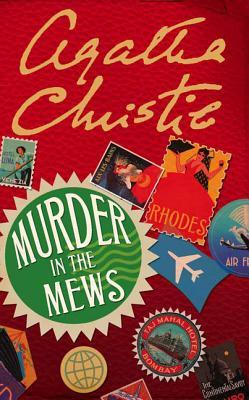
Murder in the Mews by Agatha Christie
Date Completed: July 30th 2020
Pages: 378
My Rating: ★★★
This Poirot anthology consists of one short story and three novellas, two of which are adaptations of earlier pieces. The Incredible Theft is an expansion of The Submarine Plans: A Short Story with essentially the same characters bearing different names, while Dead Man's Mirror is a lengthened version of The Second Gong: A Short Story featuring a different murderer. These are available in other Poirot collections or by their lonesome in electronic form, though if you already possess this book there may be no need for them since the fuller versions here are noticeably superior.
My favorite is the shortest piece of the lot, Triangle at Rhodes. Christie is always in fine form when exploring exotic locales, and this is no exception. Who turned out to be the victim is the actual surprise here. Once the murder is revealed, figuring out whodunit is a walk in the park.
6/10; 3 stars.
Total Books: 18 of 37 (48.65%)
Total Pages: 4,132 of 10,000 (41.32%)
 BOOK 19 of 37
BOOK 19 of 37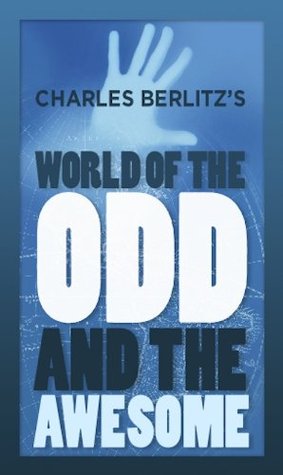
World of the Odd and Awesome by Charles Berlitz
Date Completed: August 3rd 2020
Pages: 272
My Rating: ★★★
Elusive cryptids, spontaneous combustion, prophetic dreams of tragedies and redemption, psychic detectives, archaeological incongruities - these and more populate this wondrous exploration of unexplained phenomena. And would a collection of forteana ever be complete without those ubiquitous flying saucers and the extraterrestrials who drive them?
It's not all fanciful stuff though. There are some topics that are far from paranormal, like the Pharos of Alexandria or El Greco's trial before the Spanish Inquisition. Human interest stories also abound like the dog that saved another canine from a premature burial and girls gifted with psychokinesis. There are also some scientific oddities like the possible use of electricity in ancient Egypt, or the successful modern replications of Archimedean solar warfare from ancient Greece and pre-Columbian hot air balloons in the Nazca valley. My personal favorite is the recounting of the chilling prophecies made by the French poet Cazotte during the twilight of the ancien régime. Heady stuff.
There are accounts with rather sketchy scholarship. For example: if a "death star" does drag comets around the Earth's vicinity every 28 million years causing massive global extinction events, how did dinosaurs manage to survive for 140 million years, as the article itself states? Many here don't offer any explanation at all but really, due to their brevity that's simply the nature of this beast.
Oh yes: the pieces here are all bite-sized, each numbering a page or two at most. It's quite easy to pop one or two (or a dozen, really) in one sitting. There are no illustrations, although I fail to see how that would be a con. Leave that to Ripley's - I prefer the fuller text here anyways. I did notice some typographical errors in the e-book version. Not enough to be annoying, but it still should have been proofread more carefully.
Overall it's quite good, even if it sometimes requires spoonsful of salt to swallow. After all, it's the fascination, the awe, the wonder at all the hidden things that may possibly exist under this sun that is the point. And on this count, it largely succeeds.
6/10; 3 stars.
Total Books: 19 of 37 (51.35%)
Total Pages: 4,404 of 10,000 (44.04%)
 BOOK 20 of 37
BOOK 20 of 37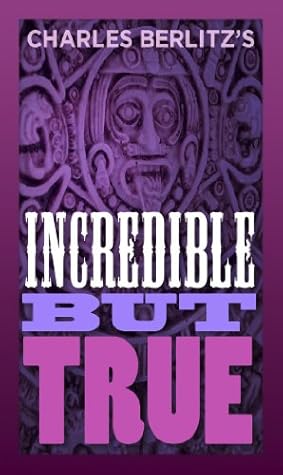
World of the Incredible but True by Charles Berlitz
Date Completed: August 5th 2020
Pages: 265
My Rating: ★★★
Lost cities from antiquity, UFOs in Ancient Rome and Egypt, the augur of a Tudor king who foresaw his own death, exorcisms, phantom armies, incendiary paintings, sea monsters - these and other strange phenomena haunt the pages of this anthology. The accounts here are rather brief, just like the other Berlitz book of curiosa that I finished prior to this. I find the stories here more interesting though, maybe because there are fewer pieces on extraterrestrials. Narratives on alien encounters usually run along similar lines so they have a tendency to become tedious.
Quite a number of the entries here, like the lost fleet of Alexander the Great and the devil of Devonshire, have already been explored in the previous book. I counted around 18 repeats, but since there are a total of 272 pieces here I don't regard this as a waste. The price of the ebook version is quite attractive too so really, nobody's getting stiffed here.
6.5/10; 3 stars.
Total Books: 20 of 37 (54.05%)
Total Pages: 4,669 of 10,000 (46.69%)
 BOOK 21 of 37
BOOK 21 of 37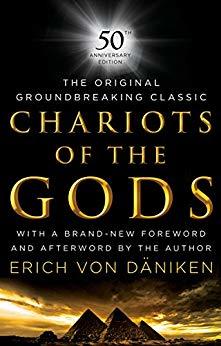
Chariots of the Gods by Erich von Däniken
Date Completed: August 7th 2020
Pages: 240
My Rating: ★★★
This is the book that spawned a massive industry. Ancient astronauts? Sounds whacky, but who knows. I'm not dismissing it outright, although some of the "facts" that Däniken stated here has already been disproven, as he himself admits in the foreword to the 50th Anniversary edition. That section also recounts the genesis of his interest in the field as a Catholic student questioning certain actions of the biblical God, while the afterword is a spirited defense of his oft-clobbered credibility. He doesn't hesitate from name-dropping luminaries in the sciences who support (or who, at the very least, don't entirely disagree with) his theories. For an octogenarian, he sure has a lot of chutzpah.
The accounts of legit archaeological anomalies here are quite fascinating. The central aspiration that fuels this book - mankind's quest to conquer the stars - still remains an irresistible vision, which probably explains the Chariots' lasting appeal. The considerable support and the weight of half a century behind it makes it hard to simply disregard.
6.5/10; 3 stars.
Total Books: 21 of 37 (56.76%)
Total Pages: 4,909 of 10,000 (49.09%)
 BOOK 22 of 37
BOOK 22 of 37
The Gods Never Left Us by Erich von Däniken
Date Completed: August 10th 2020
Pages: 256
My Rating: ★★★★
This official sequel to Chariots of the Gods was finally released around the golden anniversary of the latter's maiden publication. It is not just a rehash of the former, presenting as it does some new material though it is admittedly rather brief.
The first chapter and the postscript regale us with a fictional tale of beings from the future establishing contact with a retired schoolteacher whose son happens to work at CERN. The second deals with how ETs have been trying to gradually (and hence efficaciously) introduce themselves to humanity, while the third establishes arguments against the theories of chemical and Darwinian evolution in the realization of the modern Homo sapiens. The penultimate chapter explores how the similarities in ancient creation mythologies suggest the existence of gods who came from outer space, while the finale provides glimpses into the probable future.
I spotted a few factual errors and the author repeated some quotes and observations in a few places so it would benefit from a more judicious editing. For me, it's actually more compelling than Chariots, although maybe it's because some of the topics discussed here (like AI) are more current. Thought-provoking stuff.
7/10; 4 stars.
Total Books: 22 of 37 (59.46%)
Total Pages: 5,165 of 10,000 (51.65%)
 BOOK 23 of 37
BOOK 23 of 37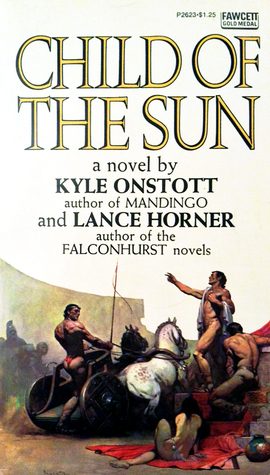
Child of the Sun by Kyle Onstott
Date Completed: August 13th 2020
Pages: 352
My Rating: ★★★
I don't think that this is such a bad piece. Licentious, bawdy, and racy it certainly is, but it is more than a mere wank book, having an honest-to-goodness plot behind it. The miserable teenage emperor who was assassinated before his nineteenth summer, the tragedies that plagued the imperial family - these are all pretty compelling. That is, if you can get past the brazen, graphic sausage fest. Really though, maybe I'm just inured to it all, having waded through the steamier and even more criminal perversions of the Emperors Tiberius, Caligula, and Nero of the Julio-Claudii.
This novel of course took some creative license with certain events and even personalities. While Soaemias comes across as nothing more than a vacuous voluptuary in it, ancient accounts show her as possessing more steel, having died trying to shield her son from the swords of the Praetorians. The bittersweet fate of Antoninus and Hierocles here is certainly just the authors giving them a less unsavory ending.
The helpful end notes culled from various history books did present the possibility that most of the posthumous opprobrium against Antoninus were devised by his Aunt Maesa to legitimize the reign of her whelp. What was that yarn again about victors and history? One can't really hate her though, knowing as we do the sad fate of her son Alexander, the last of the Severans.
7/10; 3 stars.
Total Books: 23 of 37 (62.16%)
Total Pages: 5,517 of 10,000 (55.17%)
 BOOK 24 of 37
BOOK 24 of 37
The Secret History by Procopius
Date Completed: August 14th 2020
Pages: 140
My Rating: ★★★★
If this book is to be judged as a hatchet job, then it is a spectacular failure. History has been kind to the memory of the law-giver Justinian, establishing him as one of the greatest caesars of the Byzantine Empire. That glorious reign would have been curtailed if not for his feisty Empress Theodora, who famously stood up against the danger posed by the Nika Revolt with her immortal line about the imperial purple making for a fine shroud. And what about the popular General Belisarius, who has time and again managed to snatch a miraculous victory against the jaws of certain defeat? Really - who could argue against brilliance and success?
Maybe Procopius should have toned down the hyperbole. I mean, why paint the emperor as an actual, literal demon? Indeed, the Introduction states that if all he had written were the History of the Wars, he would have been regarded as a historian of the first water, to be ranked among the likes of Thucydides and Herodotus. The survival of this Anecdota may have been detrimental to his reputation. The things a person says or writes really does reflect more on his character than on the targets he tries to malign.
But if viewed as poisonous, pseudo-historic psogos then it blossoms into something quite exceptional. The fervid detailing of unspeakable crimes, sordid passions, murderous rapacity, incompetence, corruption, perfidy, chicanery, and all manner of brazen wickedness is nothing short of inspired. As a prose stylist, Procopius holds his own against other historians. He weaves a mesmerizing tale of ultimate power wedded to the purest evil, intent on fomenting calamities, misery and bloodshed. The latter sections of the second and the entire third part are admittedly rather dry though, dealing more with administrative, judicial, and fiscal skullduggery.
In the end: well, they do say that there's no smoke without fire. The question is: how much smoke was there, really? How much of these were lies, with a view to besmirching its subjects' names in the face of posterity? If only we can get ahold of a few Constantinopolitans of the 6th century AD and listen to the whispered gossip being bandied about in the markets, in the taverns . . .
7.5/10; 4 stars.
Total Books: 24 of 37 (64.86%)
Total Pages: 5,657 of 10,000 (56.57%)
 BOOK 25 of 37
BOOK 25 of 37
The Tokyo Zodiac Murders by Sōji Shimada
Date Completed: August 31st 2020
Pages: 320
My Rating: ★★★
It's a good mystery with a chilling, dumbfounding series of murders at its core. Running red with both blood and herrings, it's the legit occult esoterica permeating the text that grabs one's attention.
And yes - Yokomizo plays fair with his readers. Either he was generous with his clues or I've read too many mystery novels, but the central trick (view spoiler) isn't that well-hidden. The execution is pure genius though.
With the epilogue, the author may be trying to humanize the culprit. Perhaps he wants us to feel some empathy for the bastard. However, you can't murder innocents (view spoiler) and expect people to pat your hand in commiseration. The ending, for what it's worth, is truly fitting.
7/10; 3 stars.
Total Books: 25 of 37 (67.57%)
Total Pages: 5,977 of 10,000 (59.77%)
 BOOK 26 of 37
BOOK 26 of 37
The Iron King by Maurice Druon
Date Completed: September 3rd 2020
Pages: 340
My Rating: ★★★
I'm rather surprised. Maybe it's the hype or the expectations stirred by what could have been an epic saga of the fall of the Capets, but this is rather underwhelming. The plot is not at fault as it has all the ingredients of a potent potboiler - salacious princesses, dynastic curses, poisoned chandlery, and all manner of delicious medieval tortures.
It must be the stilted translation. I love historical fiction and have devoured my share of Costains and Massies, both of whom are contemporaries of Druon. Here though, I had to re-read some passages twice or more, so clumsily were they constructed.
Maybe reading more of his prose would acclimatize me with his style. In truth, I had no trouble finishing this because the story was so engrossing. The strange dread that hovers over it all has already broken into a slow-stirring maelstrom that threatens to engulf France. I'm interested to see how it would all turn out, beginning with the accession of the unpromising Louis X to the throne of the foremost court in Europe.
One thing I particularly like are the aphorisms on human nature and power that the book dispenses like so much manna. Pithy maxims and astute observations make this the rare kind of entertaining treat that you can actually learn so much from, with lessons that you can apply should you ever wish to chart your own path to power. Small wonder that leaders like Putin hold this series in high regard.
7/10; 3 stars.
Total Books: 26 of 37 (70.27%)
Total Pages: 6,317 of 10,000 (63.17%)
 BOOK 27 of 37
BOOK 27 of 37
The Strangled Queen by Maurice Druon
Date Completed: September 6th 2020
Pages: 304
My Rating: ★★★
This is a pretty quick read, but that shouldn't come as a surprise since this is the shortest book in the series. The prose is still clunky in places but there's a definite improvement compared to the previous book. The story wasn't as good, though really, with all the storms and scandals of The Iron King, this lull shouldn't come as a surprise.
It's not as compelling as I thought it would be. I'm still going to keep at it though because aside from feeling like the story is about to get much better, as with the first book there is some wisdom to be gleaned from the wealth of apothegms here. Now that I think about it, I really should begin taking note of these for future reflection.
One tip if you intend to finish The Accursed Kings: don't read up on even the most minute biographical sketches of the characters in other publications/sites, at least until you polish off the entire thing. Don't even scan the blurbs for the subsequent books until you're about to start them. If you don't mind spoilers though, feel free to ignore this.
There is an evident bent here towards the modernizing party espoused by the late King Philippe IV himself, his bourgeois ministers, and his son the future Philippe V. It seems like the animosity between the baronial and the centrist factions will define the political landscape of France for a long time to come. Something tells me that it would be more for ill than anything else.
7/10; 3 stars.
Total Books: 27 of 37 (72.97%)
Total Pages: 6,621 of 10,000 (66.21%)
 BOOK 28 of 37
BOOK 28 of 37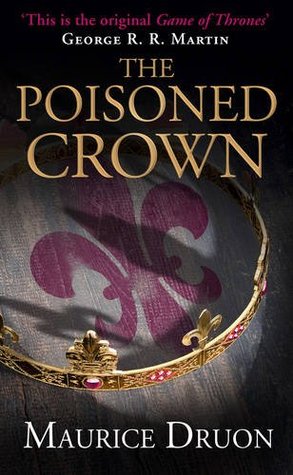
The Poisoned Crown by Maurice Druon
Date Completed: September 9th 2020
Pages: 320
My Rating: ★★★★
There seems to be a pattern in the first three books of Les Rois Maudits - they always end with the demise of a monarch. It was Philippe le Bel in The Iron King and his lascivious daughter-in-law Queen Marguerite in the immediate sequel. Here, Louis le Hutin makes his exit. One can only hope that this pattern is broken in the next book, seeing how young his prospective heirs are.
The appended family tree is the same as in the previous books, and so is not entirely helpful. I had to make my own chart to clearly see the familial relations between the royal family, the Valois, the Artois, and even the Neapolitan Anjous from which Queen Clemence came. One advice though: it isn't really that important. Just know that they all sprang from Louis VIII, Philippe IV's great-grandfather, and you're all good.
I can't care less about the Cressay side story, especially with Guccio revealing what a blackguard he is. However, it was intimated before that Marie would play an important part in the fate of the Capets, and at this stage one already gets an inkling of what it might be.
And la Comtesse Mahaut! I keep reading about her base cunning but the previous two books only showed her at her nadir, bested and disgraced. Here she made up for her defeats with an astounding act of audacious criminality.
Regarding the title of the book, I was thinking that it figuratively refers to the decadence and iniquity that the crown brings to all those who wear it. While that is unquestionably true, I now see how it can be interpreted rather more literally.
With the unfortunate reign of Louis X drawing to a close, one looks forward to the ascendance of the capable Philippe V. In the foreword, Druon reckons that he would be the only laudable ruler in the half-century after his father's demise. But first, there is the question of the late king's successor in utero. I'm looking forward to the next book.
7.5/10; 4 stars.
Total Books: 28 of 37 (75.68%)
Total Pages: 6,941 of 10,000 (69.41%)
 BOOK 29 of 37
BOOK 29 of 37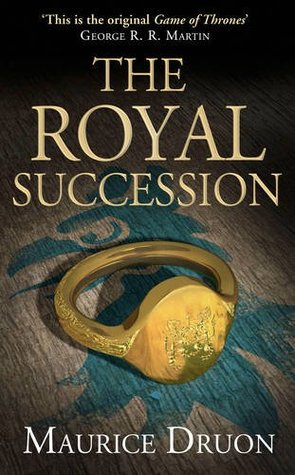
The Royal Succession by Maurice Druon
Date Completed: September 12th 2020
Pages: 325
My Rating: ★★★★
This is a deeply enjoyable book, and the volume that moved me into finishing the entire Les Rois Maudits. With my favorite of Philippe the Fair's heirs taking the center stage in the next book, I have no choice but to drink deep from this blood-red cup.
I'm of two minds as to whether the Bouvilles acquitted themselves well here. They were surely exemplary in the performance of their duties, deploying an uncharacteristic cunning to protect the life of their royal charge. But it still came at a horrible price, all because they weren't able to muster the requisite vigilance to complement their craftiness.
I don't think that Philippe can wash his hands off the whole affair either. He knows what Mahaut is capable of, and at the very least, in order to punish her he should have denied her designation as the godmother of his murdered brother's infant son, protocol be damned. But he still proceeded with it, making his motives very suspect.
Of course Fate can, when she so wishes to proclaim her preeminence, pursue ironic avenues in exacting her dues. The antiquated law that Philippe V crafted to justify his accession will later on be used to deny his progeny their claims to the throne, bringing to an end the direct line of the Capets. Such are the wages of overweening ambition.
Never has pragmatism and sadistic evil been as wedded in unholy alchemy as they were in the Countess Mahaut. Even though she was guilty of regicide in the last volume, I still much preferred her to her villainous nephew Robert, thinking that it's only the extreme circumstances she labored under that pushed her hand. After all, it was an ineffectual king who was slowly chipping away at his father's gains that she did away with, substituting a wise and capable regent in his stead. Oh how naive I was. They can both well and truly hang now.
8/10; 4 stars.
Total Books: 29 of 37 (78.38%)
Total Pages: 7,266 of 10,000 (72.66%)
 BOOK 30 of 37
BOOK 30 of 37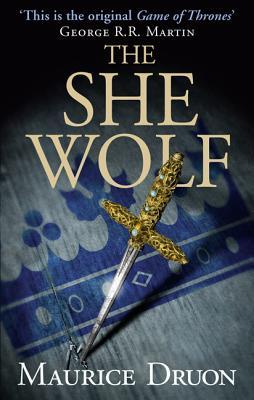
The She-Wolf by Maurice Druon
Date Completed: October 7th 2020
Pages: 464
My Rating: ★★★★
Upon starting this book, I was quite disconcerted. Its immediate prequel was very promising, threatening tribulations upon the head of the recently-crowned Philippe le Long. I thought that we're going to be treated with the exploits of the wily and sagacious king, only for the series to skip six(!) long years to the accession of his uninspiring younger brother, Charles IV. Le sigh.
All's not lost though as the book finally brings to the spotlight the favored child of the late King Philippe le Bel: Queen Isabella, the eponymous Louve de France. Unfortunately though, in this book she didn't come across as tough and as puissant as I hoped. Historians depict her as courageous, cunning, and relentless in her pursuit of revenge; here she comes across as a milquetoast whose most critical decisions are steered by love. It's a bit of a letdown, but I just remind myself that even if the curse of the Templars may have contributed to the extinction of the direct Capetian line, it was nevertheless through her that the posterity of her father survived the French Revolution four centuries hence, being a progenitor of the current Queen Elizabeth II of the United Kingdom of Great Britain and Northern Ireland twenty-two generations removed.
Even though it's one of the lengthiest entries in Les Rois Maudits, the book is rather fast-paced. This doesn't come as much of a surprise since while the previous four books cover the events of several months to a year each, here we hastened through the four years between the escape of Roger Mortimer and the murder of King Edward II. Regarding the latter, the poignant way he lost his pride and majesty after his abdication was one of the best treatments in the entire series.
I especially liked how the young Edward III was learning to wield the levers of power in his gradual ascent, avoiding the pitfalls of dependence and imprudence. This bodes well for the next book where the promising teenage king comes into his own as the singular ruler of England.
8/10; 4 stars.
Total Books: 30 of 37 (81.08%)
Total Pages: 7,730 of 10,000 (77.30%)
 BOOK 31 of 37
BOOK 31 of 37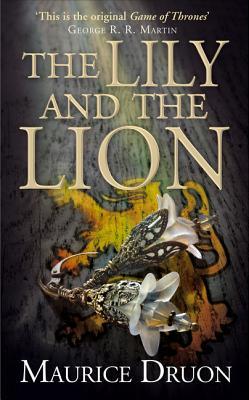
The Lily and the Lion by Maurice Druon
Date Completed: October 12th 2020
Pages: 432
My Rating: ★★★★
The series once again explores the world beyond fair France as evinced by the title, which refers to the Lilies of France and the Lions of England. This is the longest entry in Les Rois Maudits, and may have been Druon's original finale since the last one was written more than a decade after this. There's also a lengthy epilogue that spans events more than three decades after the book opens.
The series has come a long way since The Iron King. The prose translation has shown a marked improvement, as it has shed its ungainliness without sacrificing its trademark stately style. It's especially in the passages that deal with power that it approaches a transcendent loftiness, a sage worldliness that few other literary works can ever hope to capture.
I forgot to mention this in my previous reviews, but the historical notes at the end of each book were an immense help in putting certain events into perspective, or in simply adding some color to them. There were occasions in which a footnote would prove to be a spoiler, sometimes of major events in the very same book, but I'd rather not do without them. Aside from these, there's also a pretty sizable bibliography unique to this volume. It is sectioned by the main characters/institutions presented in the series.
One thing that becomes noticeable is the uneven pacing. Initially, the novel proceeded at the usual lively canter, but since the outset of the final quarter it seems like the author decided to just get it over with, galloping through decades in just a few chapters. It was rather discomfiting. Another thing I disliked is how much of the book revolved around Monseigneur Robert and the question of Artois, but I guess that can't be helped since Druon admitted that he was his favorite character.
It's still easily my favorite in the entire series. I can't wait to read the final book which, though it has been published decades ago, has only been translated into English a few years back.
8.5/10; 4 stars.
Total Books: 31 of 37 (83.78%)
Total Pages: 8,162 of 10,000 (81.62%)
 BOOK 32 of 37
BOOK 32 of 37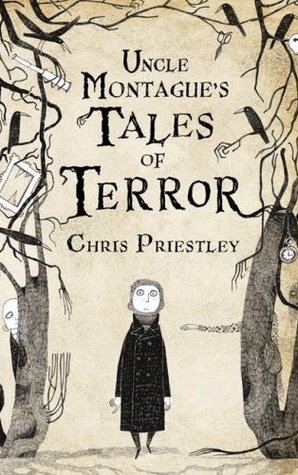
Uncle Montague's Tales of Terror by Chris Priestley
Date Completed: October 17th 2020
Pages: 240
My Rating: ★★★
This is an immensely entertaining volume of horror stories for children, possessing a distinct English sensibility. The tales are short but engrossing, featuring kids who met their ends through horrendous misadventures. It's quite on the same vein as Suehiro Maruo's The Gold Notebook, and as with that piece, one is left with a slowly dawning suspicion regarding the raconteur.
I do like the ending though. I was left with the feeling that with the conclusion of his ordeal, our narrator Edgar has grown in maturity. Symbolic of leaving childish cares behind, one may safely assume that he shall never approach his uncle for stories ever again.
6.5/10; 3 stars.
Total Books: 32 of 37 (86.49%)
Total Pages: 8,402 of 10,000 (84.02%)
 BOOK 33 of 37
BOOK 33 of 37
Confessions by Kanae Minato
Date Completed: November 5th 2020
Pages: 235
My Rating: ★★★
It's tragic and definitely absorbing at first, but after a while its surprises no longer pack a punch. The utterly unsympathetic characters (that does not include the grieving Yuko, of course) just make you want to wash your hands off these slimeballs and let Lady Justice have at them.
It's a quick read, so whatever you might feel about the story once you close the book, it'd hardly be a waste of time. Just temper your expectations.
There's something poetic about Yuko's revenge though. (view spoiler)
5.5/10; 3 stars.
Total Books: 33 of 37 (89.19%)
Total Pages: 8,637 of 10,000 (86.37%)
 BOOK 34 of 37
BOOK 34 of 37
Our Young Man by Edmund White
Date Completed: November 11th 2020
Pages: 304
My Rating: ★★★
For a book that started with such promise, this ended up being a disappointment. Of course, White's prose is still as divine as ever. There was never any doubt there.
But how I wish that Guy took the fullest advantage of his looks, wielding it like the powerful weapon that it could have been. For such a "historic" beauty to only finagle two (admittedly choice) properties from his besotted daddies is laughably weak, especially since he was able to extend his modeling career to around two decades. White did try to drum him up as an homme fatal of sorts, but sadly that fell flat on its face.
Also: what an empty, depressing ending. (view spoiler)
6.5/10; 3 stars.
Total Books: 34 of 37 (91.89%)
Total Pages: 8,941 of 10,000 (89.41%)
 BOOK 35 of 37
BOOK 35 of 37
The Best Horror of the Year Volume Twelve by Ellen Datlow
Date Completed: November 17th 2020
Pages: 480
My Rating: ★★★★
Last year's selection was far superior to this, but there's still some quality scares to be had here. Before proceeding to the stories, the editor presents a survey of the horror scene in 2019. It suggests some promising reads.
As with most anthologies, there are gems scattered among ponderous bores. I noticed that the choicest morsels can be found in the middle portion, after one slogs through some uninspiring appetizers.
It finishes on a soaring note though. Like last year's volume, the most intriguing piece here features cannibalism, although it's more or less incidental to the sprawling plot.
The best stories are:
The Puppet Motel - AirBnB from hell.
The Night Nurse - an exhausted mother contracts the services of a peculiar nanny.
They Are Us (1964) : An Oral History - a haunted book is developed into an inevitably cursed film.
I Say (I Say, I Say) - how comedies play out in the afterlife.
The Butcher's Table - a besotted satanist braves the terrors of the high seas to wed his lady-love in the very mouth of Hell.
7/10. I'm tilting it to 4 stars because of Ballingrud's masterful novella.
Total Books: 35 of 37 (94.59%)
Total Pages: 9,421 of 10,000 (94.21%)
 BOOK 36 of 37
BOOK 36 of 37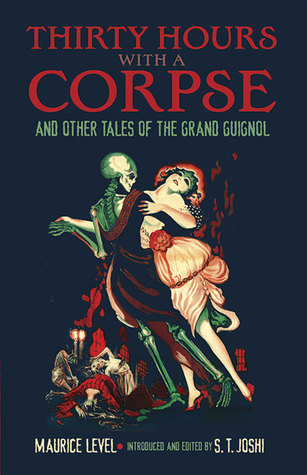
Thirty Hours with a Corpse and Other Tales of the Grand Guignol by Maurice Level
Date Completed: November 22nd 2020
Pages: 224
My Rating: ★★★
Being a bit of a gorehound, I've always been fascinated by the Grand Guignol. Years ago I tried to find out more about the actual plays they produced but I've had little success. That's why it was with something approaching ecstasy that I came across this book.
However, these tales did not really meet my expectations. Some were too sentimental or exaggerated, while in others you can see the twist coming a mile away. A few of the diseases tackled here like tuberculosis are not as disabling or deadly as they once were, thereby losing their sting. One wonders how these stories would translate to theater although I reckon there may have been embellishments to spruce up the plot and ramp up the excitement.
I do like their brevity. Along with the easy flow of the translated prose it makes the book easy to pick up and read just about anywhere. Some of the pieces here are actually quite entertaining and even *gasp* heartwarming.
These are compelling vignettes traversing a well-trod landscape - of sickness, poverty, war, misery, obsessions, crimes, and madness. You may want to steer clear if you're presently unstable, seeing how one of the motifs here is the susceptibility of the emotionally vulnerable to suggestions of a darker cast.
Among the more striking tales in this collection are:
A Mistake - the perils of misdiagnoses.
The Confession - an ex-magistrate squanders his life expiating for a lie.
That Scoundrel Miron - a fugitive artist trades his future for the past glories of his besmirched name.
The Taint - postpartum depression gone horribly awry.
The Last Kiss - a mistress, forgiven by the man she willfully blinded, grants him one last kiss
The Look - a deep, passionate love is poisoned by guilt.
She Thought Of Everything - murder is a two-edged sword.
7/10; 3 stars.
Total Books: 36 of 37 (97.30%)
Total Pages: 9,645 of 10,000 (96.45%)
 BOOK 37 of 37
BOOK 37 of 37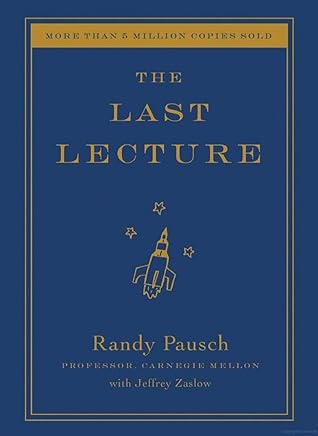
The Last Lecture by Randy Pausch
Date Completed: December 11th 2020
Pages: 224
My Rating: ★★★
The first three sections are more of an autobiography than not, tackling bits of his personal and family life; specific technical projects he worked on, the jobs he had and the people he mentored, etc. They did contain some nuggets of advice, but the self-help part is most evident in the fourth and largest section. It has more chapters than all of the other sections combined but it's much shorter, presenting more pithy, distilled lessons. It still contains snippets of Pausch's actual experiences to buttress his assertions.
Some of the advice were rather trite or saccharine bordering on the cheesy while a few were very basic. I mean, at one point he did admit that he liked clichés. Some of them I flat-out don't agree with; in these cases I can easily come up with situations that would beg the contrary.
Still, many were remarkably useful. Here are some which I found particularly resonant:
Have something to bring to the table, because that will make you more welcome.
Ask yourself: Are you spending your time on the right things? Time is all you have. And you may find one day that you have less than you think.
The brick walls are there to stop the people who don’t want it badly enough. If you want something, never give up (and take a boost when offered).
Sometimes, all you have to do is ask.
The most significant lesson I gleaned here is how important it is to articulate your very own dreams, in detail if necessary. This is not just to give you the awesome high that accompany the achievement of lofty goals. Later on, when you're facing the worst crises, you can have a bevy of memorable milestones that you can fondly look back to as a source of inspiration and strength.
6.5/10; 3 stars.
Total Books: 37 of 37 (100.00%)
Total Pages: 9,869 of 10,000 (98.69%)
 BOOK 38 of 37
BOOK 38 of 37
Some Extraordinary Popular Delusions by Charles Mackay
Date Completed: December 22nd 2020
Pages: 144
My Rating: ★★★★
This Penguin Great Ideas edition includes only four select chapters from the first two volumes of Mackay's masterwork. It can then only serve as an aperitif to that feast - but if these are any indication then we are in for a great treat. It covers a diverse array of interesting subjects, from the faddish slang/songs that time and again infect the less salubrious quarters of Europe's great cities to the speculations that fueled the ruinous bubbles in the trade of dubious stocks and tulips.
The most absorbing chapter here is also the longest. The South Sea mirage spawned so many bubbles, London could have given a Songkran foam party a run for its money. Just imagining the magnitude of the devastation this scam has wrought on houses both common and noble is enough to make one shiver.
That the whole thing initially had the imprimatur of the British government, which sought to unload part of the national debt using the company as an instrument, is what made the whole thing so egregious. It's a good thing that a measure of justice was achieved against many of the principal defendants. Compare that to our current Too Big To Fail leviathans. As they only made too clear during the Great Recession, even a mere slap on the wrist would have been too much to expect in this enlightened age.
The chapter on slow poisons is also very intriguing, regaling us with the tribulations of a king whose male lovers dabbled in that craft and, possibly, regicide. Its alarming prevalence in 17th century Italy was also dissected, showing how young wives who wished to off their husbands formed a clandestine, criminal cabal and how powerful ecclesiastics defended a prolific poisoner from the clutches of the law. From thence this mania spread to fair France. There, the avaricious discarded all the impediments in their ignoble path to great wealth. As in Italy, this fad also inspired the fatal dissolution of many an unhappy marriage.
The folly of crowds is a fascinating thing, and all too often a weapon that someone with enough savvy can exploit to his advantage. At no time is this more relevant than now, where the prevalence of social media, PR, and good old-fashioned mobs wielding (digital) pitchforks can, in a matter of hours, bolster or destroy institutions, personal reputations, or simple common sense.
This book presents these cautionary tales in a language that, though far from contemporary, is still very much engaging. With incredible highs and tragic lows, sordid villainies and metaphorical trainwrecks you can't help but rubberneck at, I guess this is the nonfiction equivalent of thrillers? In any case, I'll definitely be reading the complete three-volume set in the future.
7.5/10; 4 stars.
Total Books: 38 of 37 (103.70%)
Total Pages: 10,013 of 10,000 (100.13%)
Books mentioned in this topic
Some Extraordinary Popular Delusions (other topics)The Last Lecture (other topics)
Thirty Hours with a Corpse and Other Tales of the Grand Guignol (other topics)
The Best Horror of the Year Volume Twelve (other topics)
Our Young Man (other topics)
More...
Authors mentioned in this topic
Charles Mackay (other topics)Randy Pausch (other topics)
Maurice Level (other topics)
Ellen Datlow (other topics)
Edmund White (other topics)
More...




